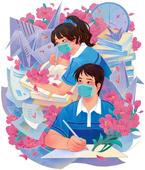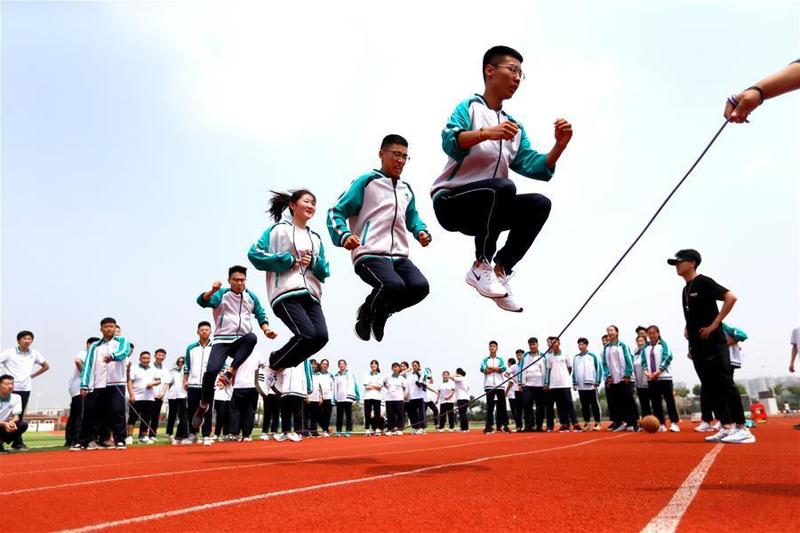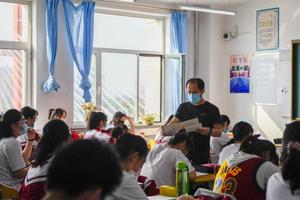Outbreak, restrictions mean added pressure for those hoping to get into university but adapting properly can lead to success, Xing Yi reports in Shanghai.
 (ZENG YI/FOR CHINA DAILY)
(ZENG YI/FOR CHINA DAILY)
Plans change. It's a lesson we all know and appreciate. No matter how detailed, thought-through, two words, with the same number of letters, will always be beyond our control-life and fate. Liu Dang is a prime example. The senior student in Wuhan, Central China's Hubei province, didn't do as well as expected in the national college entrance exam last year and decided to resit the exam.
Liu was confident he could do better this year. But the COVID-19 pandemic hit his city and scuppered his plans. Of course he was not alone. His story, fate, bad luck, call it what you will, was shared by millions of other students planning to graduate from high school this year.
Some students complain about their fate ... but I tell them that there is always a silver lining to everything, and this special year is actually a precious year in their lives, like a treasure, when they look back on it in the future
Xu Xiaomin, a chemistry teacher at Wuhan High School
For Chinese, the college entrance exam, or gaokao, is the most important test in their student life-the score decides which university they will enter in autumn.
According to the Ministry of Education, the number of applicants for the exam this year is 10.71 million, a record since the exam started in 1952.
The outbreak of the novel coronavirus has made the exam, which has already been postponed from June to July 7, even more significant. Some cities will run the exam from July 7 to 8, while other cities will hold it for two more days until July 10.
"Originally, I planned to focus on the art exam in February, and then go back to prepare for the general test, but everything changed," says Liu.
The coronavirus put Wuhan, the hardest hit city during the outbreak, in lockdown from late January to April, disrupting all scheduled exams. Some were canceled, some delayed and some changed their format.
Liu applied for an art major in broadcasting and hosting. Instead of going to different universities for on-site exams on performance and voicing, he had to buy a camera and microphone to record his own showreel to submit online.
He spent a great deal of time preparing his work to meet the criteria of different universities. For one, he recorded a broadcast on truck drivers delivering supplies to Wuhan amid the lockdown.
"I submitted it to apply for my ideal university-the Communication University of China. But the work didn't pass," he says, adding that he had actually cleared the on-site interview for that university last year, but failed the general gaokao exam.
"It has been a hard time so far, but after last year's blow, I chose to resit the exam this year, and it's my own choice, so I don't regret it," he says. "Now I don't have time to feel remorse. All I can do is work harder for the general test."
 High school seniors in Qingdao, Shandong province, jump rope to blow off steam on June 14. (LIANG XIAOPENG / XINHUA)
High school seniors in Qingdao, Shandong province, jump rope to blow off steam on June 14. (LIANG XIAOPENG / XINHUA)
Online learning, teaching
Because schools nationwide had shut their campuses, students had to take courses online before May.
Xu Xiaomin, a chemistry teacher at Wuhan High School, says it took the whole of February for herself and her students to get used to online teaching and learning.
"Some students felt at a loss when facing a computer screen, as there is no immediate feedback or interaction with other students," Xu says.
As a teacher, Xu has tried many methods to adapt to the new way of teaching. She learned to use new video-editing software, livestreaming platforms and virtual whiteboards, among other e-learning apps.
"There's a lot to learn for us teachers, too," Xu says, adding that the school and the local education bureau organized seminars and training for teachers in February.
"Everyone was fumbling around in the virtual world, and teachers shared their tips for online teaching with each other during the process," she says, adding that in the beginning she had to spend three to four hours to prepare for one 45-minute class.
In Shanghai, the city launched a television class for its 1.4 million students from primary to high schools, with each class lasting 30 minutes.
Zhou Tianchen, a student of Shanghai Wuai Senior High School, says he found that his individual needs were not addressed.
"It often happened that I had not finished reading the question before the teacher on TV started to explain it," Zhou says.
Online teaching also reduced the amount of mock tests that he used to take. "We need more written tests to get familiar with the real exam. Taking tests online is different to using pen and paper," he says.
Other problems also emerge, not least distractions.
 Seniors at a polytechnic school in Enshi, Hubei province, ease their nerves in the playground on June 10 during preparation for their final test. (LIANG XIAOPENG / XINHUA)
Seniors at a polytechnic school in Enshi, Hubei province, ease their nerves in the playground on June 10 during preparation for their final test. (LIANG XIAOPENG / XINHUA)
Final sprint on the ground
From late April, high schools across the country started to reopen for senior students like Zhou and he felt relieved to finally return to school. "I wanted to go back to the classroom because I have been stuck at home for such a long time. It was boring and tedious," he says.
However, things are not exactly the same on campus. The hot summer is approaching, but air conditioning is not allowed on for safety reasons. Students are required to wear masks at Zhou's high school, which feel hot and uncomfortable, making it harder to concentrate.
He can no longer have the lunch of his choice in the cafeteria, but has to eat from the lunchbox sent to the classroom. Boarders are restricted from leaving the campus.
The 40 students that Xu teaches are split into two classes to reduce the density. The school has managed to install cameras to live broadcast Xu's instruction in one classroom to the other.
"I have taught five graduate classes for five years. This year the students' grades are more polarized-some have done better after three months of studying at home, but some have done more poorly," she says.
Besides teaching chemistry, Xu is also a class supervisor and she often holds meetings with students and communicates with their parents.
"Some students complain about their fate and blame the pandemic, but I tell them that there is always a silver lining to everything, and this special year is actually a precious year in their lives, like a treasure, when they look back on it in the future," she says.
Ni Jingru, a student of the High School Affiliated to Fujian Normal University, says she feels lucky to have an extra month to prepare for the exam. "It gives me more time to review my study, making me feel more relaxed," Ni says.
 A teacher passes out test papers to high school seniors in Jilin province, on June 8. (LIANG XIAOPENG / XINHUA)
A teacher passes out test papers to high school seniors in Jilin province, on June 8. (LIANG XIAOPENG / XINHUA)
Taking it in their stride
The advent of COVID-19 has not only disturbed students' normal learning pace, but also affected the organization of the exam and the college admission work.
Although the outbreak has been largely controlled across the country, students have to check their temperature every day, answer the epidemiological survey and sign the health declaration form to enter the exam sites.
Besides health self-declaration from students, the Ministry of Education requires all exam sites to be disinfected, well-ventilated, store sufficient personal protective equipment, set up isolated special channels and have backup exam rooms. The exam staff also take training on related safety measures.
Since April, most universities have taken their promotion online. In live broadcasts, recruiters introduce the academic advantages and admission policies to students in different provinces, answering questions on applications.
Renmin University of China, for instance, has held at least 15 live broadcasts related to enrollment so far.
Pan Weijie, head of the admissions office of Fudan University, said in a live broadcast on May 27 that the school will give more details to students after gaokao and answer their inquiries about their scores and admissions.
"Right now, the most important thing for students is to better use the remaining days to prepare for the exam," he says.
Teacher Xu says: "I always tell my students: When you sit the exam, take it as normal."
Gu Yuhan contributed to the story.
Contact the writer at xingyi@chinadaily.com.cn


